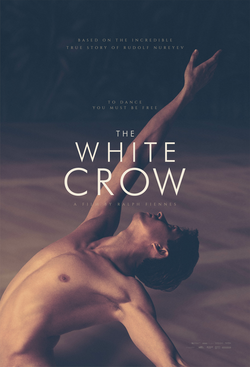Ralph Fiennes foray into direction started with a
modernized adaption of a lesser known Shakespeare play, Coriolanus. In between this and his latest effort (White Crow) was a rather unextraordinary effort about Charles Dickens,
but his latest effort is notable for Fiennes working in another language,
albeit one he speaks fairly well. Still I can’t think of many British directors
that make films in a different language.
White Crow is about legendary ballet dancer
Rudolf Nureyev (Oleg Ivenko) and his defection from the Soviet Union to the
West whilst on a tour in Paris. Fiennes’ film about the iconic ballet dancer
was never going to be a film about the dancing, this is clear because of the
time period the film focuses on. Due to the fact that the film focuses on the
period of time where Rudolf defected from the USSR the film is about the
different ideologies of communist USSR the capitalist West, their different
ways of life and different levels of personal choice and freedom granted to its
citizens.
In the regard the film is an interesting watch as
it compares the two worlds. The reaction of the tour group to Paris when they
first arrived was one of wonder at this world of culture and freedom. Nureyev’s
reaction is central to the film as he makes the most of the chance to explore
the city of Paris. He visits the celebrated art galleries, marvelling at the
masterpieces restricted by his regime. Emphasis is added to the French motto Liberté, Égalité, Fraternité emblazed on
the statue in the centre of Place de la Republique to highlight what is non-existent
in his homeland.
The tour group make the most of this chance to
experience the freedom of the West. The freedom to shop, watch great theatre in
the grandest of buildings and drink merrily into the night. But there’s always
the threat of the KBG and their bureaucrats attempting to stamp out any threat
of westernization that may infect and topple the regime. There is always an
uneasy feeling leering over Nureyev anytime he doesn’t tow the party line,
especially when he becomes more acquainted with his new western friends.
As the film is more about the politics than the
dancing I do feel the ballet was neglected. I knew nothing of the man before
the film and I never convincingly sold as to why people considered him the
greatest male dancer of his generation. Only experts can tell the difference
between a good dancer and a great dancer and whilst the film highlighted
Nureyev’s ability to dominate the stage I still never fully understood what
made him so great.
The dancing is still important to the film, and
the ballet scenes are beautifully filmed. Oleg Ivenko is a dancer himself, so I
am comfortable in the authenticity of these scenes, but I felt he was more at
home when dancing or speaking in his native language then he was speaking English.
His performance is good, but at times I felt he was slightly wooden when
speaking in English (but the scene in the airport is an incredible sequence).
Any with scene with his German boyfriend was painful to watch due to the
blandness of their chemistry.
It’s an impressive effort from Fiennes who
clearly took this project to heart looking deeply into the heart of the matter
as to why Nureyev defected from his homeland.
3.5/5




I saw Shazam and the movie was awesome
ReplyDelete